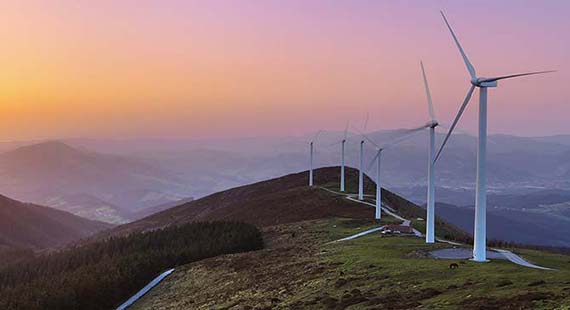
Sustainability for small and medium-sized enterprises (SMEs)
Sustainability for small and medium-sized enterprises (SMEs)
“Increasing energy efficiency not only enhances the image of the company, but also reduces cost and boosts profitability.”
Eric Paulsen
General Manager, TÜV SÜD Indonesia
Tuesday, February 27, 2018
Small and medium enterprises (SMEs) are the backbone of the economy. While the individual impact of SMEs is small, their collective contribution is substantial. As Michael Schaper, business studies professor at Curtin University, writes, “SMEs typically represent about 95 percent of all private sector firms in most modern nations, and so form a major portion of all economic activity.” The role these small firms play is a key part of the sustainability debate.
It is a sentiment echoed by Mr. Eric Paulsen, General Manager of TÜV SÜD Indonesia. Mr. Paulsen added, “If SMEs adopt sustainable policies, it will lead to reduced emissions and greener business practices. Reducing energy consumption or opting for clean energy supply not only boosts the image of the company, but also reduces cost and increases profitability.”
However, it is only recently that there has been an upward trend in SMEs adopting green business practices.
Mr. Paulsen attributes this to a lack of knowledge and understanding about why and how SMEs should undertake these practices, leading to the perception that radical production changes, involving large investments, are required. This is especially daunting for small businesses with limited financial capacity to make such investments. “Sometimes, an SME is too small for financial institutions to even consider providing financial backing,” noted Mr. Paulsen.
Thankfully, this reality is rapidly changing. Across the region, SMEs are taking steps, with the help of government agencies, to become more energy efficient. The ASEAN Centre for Energy, a think tank and knowledge hub for energy sustainability, works to facilitate international and regional cooperation for improved energy efficiency management across Southeast Asia.
These are steps lauded by Mr. Paulsen. “The two pillars of energy efficiency are policy regulation and financing. Unless energy conservation measures are made mandatory, it is very difficult for SMEs to want to participate,” he said.
Two years ago, Indonesia made the promise to cut carbon emissions by nearly 30 percent by 2030 and gradually move towards renewable energy. However, many of the country’s SMEs still use old technology and equipment, and continue operating procedures that adversely affect the environment. Tofu and tempe producers for example are known to be extremely energy inefficient and environmentally damaging, emitting 30 million tons of greenhouse gases a year. This is due to their use of firewood rather than liquefied petroleum gas (LPG) – the latter produces 75 percent less emissions than firewood.
In the face of such damaging effects, some SMEs have been galvanised to switch to energy efficient methods of production, and more responsible corporate policies.
In partnership with German Investment & Development Corporation (DEG), TÜV SÜD initiated a year-long programme called ‘Energy Efficiency and Carbon Footprint project’ that taught SMEs how to audit, benchmark and reduce their businesses’ energy consumption with minimal disruptions. Mr. Paulsen likens training energy managers in companies as “fishing skills” that should be imparted so that they can be “fed” for a lifetime.
“In this project, TÜV SÜD educates companies about not needing to invest in new equipment to transform their business into an environmentally friendly one. The measures they need to take are reviewing and improving operational practices, and maintaining equipment for energy saving,” Paulsen concluded. In 2015 alone, TÜV SÜD has provided such training for 120 companies.
Haldin, an Indonesian supplier and developer of raw materials for food, pharmaceutical and cosmetic industries, worked with TÜV SÜD to identify ways of improving energy efficiency, within their means. An initial energy audit was conducted to identify sources of energy leakages in piping and machinery. This then propelled Haldin to install energy efficiency meters and introduce energy recycling processes in their manufacturing lines. They also installed a solar-to-gas converter to cut dependency on fuel. The changes went beyond their machinery. With the help of TÜV SÜD, Haldin started training courses to educate and change the mindsets of its employees, to prioritise sustainability and establish employee buy-in for these new energy efficiency measures.
KMK Global Sport, a footwear manufacturer for Nike, also implemented an energy management system with the help of TÜV SÜD; it was a systematic, top-down initiative, where management representatives were trained in energy efficiency practices first. After the system was implemented, the company was able to add energy-saving practices in standard operating procedures – investing in energy-saving LED lamps and E-motor sewing machines. All this resulted in a 5 to 6 percent reduction in costs per annum.
These case studies prove that being more energy efficient can add business value while contributing to wider environmental issues. This was backed by a 2016 study by the World Wildlife Fund, which found that after 60,000 green initiatives were implemented by Fortune 500 companies, there was a decrease of 54.7 million metric tons of greenhouse emissions, resulting in combined annual savings of US$2.5 billion.
Besides cost savings, there is also the irrefutable notion that consumers prefer green companies. A study by Nielsen showed that 72 percent of millennial consumers will shop at companies with sustainable practices, while 66 percent of all global consumers are willing to pay a premium for goods from a green company.
No matter its size, every SME has a part to play in national and global efforts to reduce carbon emissions. The transition towards greater energy efficiency is a very important first step, as SMEs broaden their knowledge and understanding of adopting green business practices.
With support from and cooperation between governments and private organisations like TÜV SÜD, all SMEs can make a smooth transition, resulting in reduced losses from energy wastage and improved profitability.

At a time when our thirst for energy is greater than ever, managing our future energy needs is an increasingly delicate task.
Learn more
Site Selector
Global
Americas
Asia
Europe
Middle East and Africa